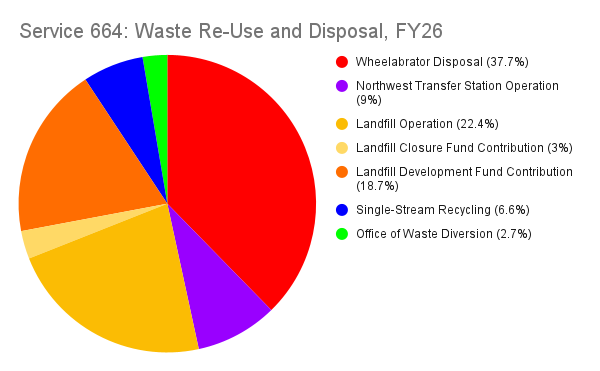
In advance of Taxpayers’ Night, the City Council’s annual public hearing on the proposed City budget, Clean Water Action and the South Baltimore Community Land Trust have released an analysis of the FY26 proposed budget showing that it fails to invest in Zero Waste programming and infrastructure despite significant new revenue and surpluses in solid waste.
In 2024 following the City's publication of the 10-Year Solid Waste Management Plan, the South Baltimore Community Land Trust, represented by the Environmental Integrity Project and Chesapeake Bay Foundation, filed a Civil Rights Act Title VI complaint against Baltimore City over its failure to fund a transition away from reliance on the BRESCO trash incinerator. As the complaint documents, the air pollution from the incinerator contributes to the unequal health risks faced by people living in Baltimore’s Mt. Winans, Westport, Cherry Hill, Lakeland, Brooklyn, and Curtis Bay neighborhoods.
Now, almost a year after this complaint was filed, the proposed FY26 budget does not include needed investments in Zero Waste solutions. It adopts only half of one request that SBCLT identified in its Title VI complaint, increasing the landfill tip fee for large haulers at Quarantine Road Landfill, but fails to reinvest the revenue in programs needed to divert waste from landfilling and incineration. It even steps backward from capital funding for Zero Waste infrastructure that had been included in FY27-FY30 in previous Capital Improvement Program plans.
“Our civil rights complaint finally pushed the City to update the cost of dumping at the landfill—something that hasn’t happened since 1993, before I was even born,” said Carlos Sanchez, Youth Outreach Specialist with the South Baltimore Community Land Trust. “But raising revenue means nothing if that money isn’t used to fix the harm. Not a single dollar is earmarked to stop the toxic cycle of burning and burying waste in our communities. Budgets are moral documents—and this one fails to reflect the values of justice, health, or equity. At a time when Title VI and civil rights are under attack nationwide, it’s more critical than ever not to exploit this tool or divert it from its purpose. Using our complaint to raise revenue without addressing the underlying injustice is a betrayal of the very communities Title VI was designed to protect.”
The proposed FY26 operating budget includes $8.4 million new revenue from increasing the tip fee Baltimore City charges large haulers to dump waste at Quarantine Road Landfill, and this is not the only money that could be available in the budget for Zero Waste. Recent FY25 quarterly budget briefings from the Bureau of Budget and Management Research have shown that the Department of Public Works has a $6 million projected surplus in FY25, and has brought in $2 million unanticipated revenue from higher-than-projected landfill tip fee totals. BBMR named last year’s unprecedented 37% increase in the incinerator disposal budget as contributing to DPW’s FY25 surplus, but the FY26 budget maintains this level of funding.
But despite these new revenues and surpluses, the FY26 budget proposal does not invest this money in Zero Waste. Recycling collection and administration receives only 10% of Waste Removal and Recycling funds, compared to 81.5% for trash and bulk trash collection. Recycling processing and the Office of Waste Diversion receive just 9% of Waste Re-Use and Disposal Funds, compared to 81.8% for incineration and landfilling.
At a recent oversight hearing, the City Council learned that DPW had requested funding for the FY26 budget to begin separate yard waste collection and composting, a service all surrounding counties offer, but that the Scott administration denied that funding request. This program would cost less than half of the new revenue generated by the increased landfill tip fee.
At the same oversight hearing, the Council learned that we have moved backward: between 2017 and 2024, although the volume of DPW-hauled waste diverted from incineration increased by 8,000 tons, the volume of DPW-hauled waste brought to BRESCO increased by 80,000 tons, and the City’s total waste diversion rate actually decreased from 18% to 16%. This is a result of the City’s lack of budgetary investment in Zero Waste programs, policies, and infrastructure in the last five years. This pattern cannot continue for another five.
“The City Council should amend the FY2026 budget proposal to invest in the proven Zero Waste solutions that our surrounding counties in Maryland use, that frontline communities in Baltimore have demanded, and that Mayor Scott’s administration has promised,” said Jennifer Kunze, Maryland Organizing Director with Clean Water Action. “Our budgets show our values, and this budget doesn’t value Zero Waste. The City will not make progress without funding the Zero Waste programs and infrastructure we need - and the City hasn’t funded them.”
Upon taking office, Mayor Scott promised that his administration would “Reduce chronic health disparities across racial and ethnic groups by decommissioning the use of waste incineration within the next decade” in his First Term Action Plan, but this budget and his administration’s proceeding budgets do not fulfill this promise. Without amendment, the proposed FY26 budget represents a failure to keep the promises City leaders have made to invest in Zero Waste solutions and make the City’s 2021-2031 contract to burn waste at BRESCO, almost halfway over, its last.